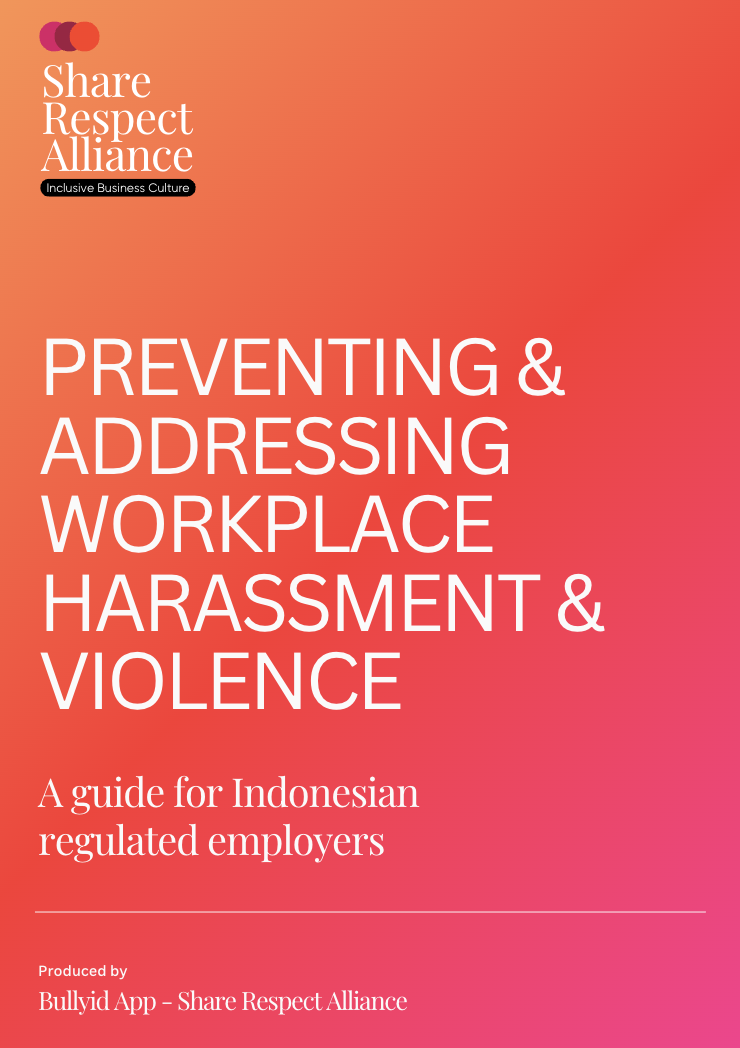Despite recent legal milestones and growing public awareness, workplace harassment and violence remain deeply entrenched in Indonesian professional culture. From manufacturing plants to corporate offices, Indonesian workers are enduring a silent crisis—one that continues to harm livelihoods, mental health, and the national economy.
The numbers are staggering. According to the International Labour Organization’s (ILO) 2022 report, 70.93% of Indonesian workers have personally experienced workplace violence or harassment. An additional 72.77% have witnessed such acts, and 53.36% have both experienced and observed them. Psychological violence remains the most prevalent, affecting over 77% of victims, followed by sexual harassment at 50.48%—with many victims experiencing multiple forms of abuse.
These figures aren’t just statistics—they are the lived realities of millions, many of whom suffer in silence. As our report stated, the cost is not only emotional but also economic. Victims are more likely to experience mental health issues, resign from their positions, or lose access to career progression. When left unaddressed, workplace harassment reduces productivity, fosters toxic environments, and increases staff turnover—hidden costs that businesses can no longer afford to ignore.
Legal Progress, but a Long Road Ahead
Indonesia has made progress. The landmark Minister of Manpower Decree No. 88/2023 offers the clearest framework yet for employers on how to prevent and address sexual violence in the workplace. It mandates the formation of in-company task forces, guarantees victim confidentiality, and outlines sanctions against perpetrators.
At the same time, the Sexual Violence Law (UU TPKS No. 12/2022) criminalises a wide spectrum of abuses—from verbal harassment to coercive physical assault—imposing penalties ranging from fines to 12 years’ imprisonment for aggravated cases involving authority misuse.
Yet, Indonesia has not ratified the ILO Convention No. 190—the world’s first international treaty recognizing the right to a workplace free from violence and harassment. This hesitance leaves a gap in alignment between national commitments and global human rights frameworks. Without ratification, enforcement remains fragmented, and employers have less incentive to go beyond compliance.
In short, while the legal architecture is improving, its translation into corporate practice remains uneven.
Sexual Harassment: An Unspoken Workplace Currency
The Bullyid App report also sheds light on how power dynamics in Indonesia’s workplaces enable exploitation. “Quid pro quo” sexual harassment, where a promotion or protection is conditioned on sexual favours, continues to fester in hierarchical settings. Meanwhile, hostile environments—plagued by sexist jokes, explicit images, or lewd remarks—are still dismissed as ‘office banter’ in many industries.
The culture of silence exacerbates the problem. In a nation where social harmony is prized and speaking up can be viewed as insubordination, many victims—especially women, LGBTQ+ individuals, and junior employees—opt to remain quiet. When harassment is reported, it is often trivialised, or worse, retaliated against.
Legal frameworks aside, fear of backlash remains a formidable deterrent. Even with protections enshrined in the Decree No. 88/2023, only consistent implementation and leadership from the top can begin to dismantle these embedded norms.
Cyber Harassment Is Eroding the Line Between Personal and Professional
The digital workplace, while offering flexibility and mobility, has opened new frontiers of abuse. Harassers now use WhatsApp, social media platforms, email, and other online channels to harass employees beyond the physical boundaries of the office. The ITE Law (Law No. 11 of 2008) and UU 1/2023 address online defamation and distribution of indecent content, but enforcement is limited, especially for nuanced digital behaviours like online stalking or persistent lewd messaging.
Bullyid App has documented cases where victims were tracked through professional networking sites, impersonated through fake profiles, or bombarded with explicit content after work hours. The psychological toll is compounded by the sense of powerlessness, particularly when perpetrators are in positions of authority.
Building Safer Workplaces Is No Longer Optional—It’s an Economic Necessity
Workplace harassment isn’t just a moral or legal issue—it’s a business one. Studies from the International Finance Corporation (IFC) show that harassment leads to higher turnover, absenteeism, lower productivity, and increased reputational risk. In a country like Indonesia—where nearly half of the workforce is made up of women, and where youth unemployment remains high—creating safe, respectful workplaces is essential to economic resilience.

The Ministerial Decree rightly lays out the minimum: policies must be in place, task forces must be active, training must be ongoing, and physical infrastructure—such as separate restrooms and well-lit corridors—must support safety. But change will require more than policy—it demands cultural transformation.
Corporate boards and HR departments must treat this as a governance priority. Technology can play a crucial role too: platforms like Bullyid App offer anonymous, secure, and confidential reporting, allowing victims to speak without fear. Businesses that integrate such tools signal their readiness to protect—not punish—those who come forward.
A Missed Opportunity or a Moment for Leadership?
Indonesia stands at a crossroads. It has the laws, the frameworks, and the mounting public pressure. But unless companies begin to implement these tools with intent—and unless the government ratifies ILO Convention 190 and establishes a national oversight body—many of these efforts risk becoming performative.
What’s needed is leadership: from government ministers, from CEOs, and from labour unions. From incorporating harassment training in employee onboarding, to empowering women-led compliance committees, to investing in legal aid and counselling—there are practical, scalable steps that can reshape Indonesia’s workplace culture.
Until then, the data speaks for itself. One in two workers are suffering. One in three have no one to report to. Behind every number is a name, a face, and a life interrupted.
If Indonesia wants to position itself as a regional leader in responsible business and sustainable growth, it must begin by protecting the people driving its economy.
No worker should have to choose between their job and their dignity.
Written by: Agita Pasaribu





